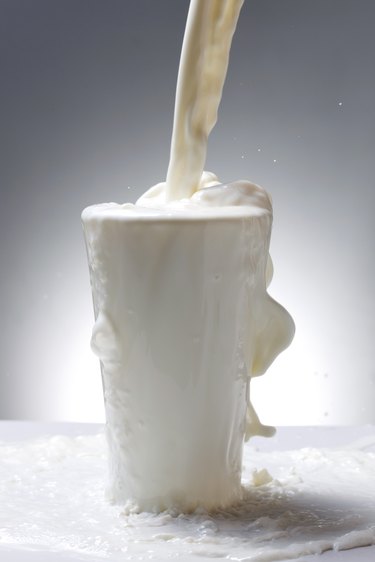
Lactose is milk sugar; you consume it any time you drink milk or eat dairy products. To absorb its components and use them for energy, you digest it with lactase, an enzyme produced by your digestive tract. Lactase reacts with lactose, splitting it into two smaller sugar molecules that you can absorb.
Lactose
Video of the Day
Lactose, or milk sugar, is very similar in chemical composition to sucrose, which is table sugar. The two actually have identical chemical formulas; they're both C12H22O11. Structural differences, while minor, make a significant difference in the taste and processing of the sugars, however. Sucrose is much sweeter than lactose. Additionally, you digest lactose and sucrose with different digestive enzymes.
Video of the Day
Lactase and Digestive Enzymes
The process of digestion is a complex one. You could break down most of the foods you eat using only acid -- such as the gastric acid produced by your stomach -- and water. This process would be very slow, however. To speed things along, your body relies upon many different digestive enzymes, which are proteins that help reactions take place faster than they otherwise would. Enzymes are very reaction-specific. Lactase, for instance, can only act on lactose.
Lactose and Lactase Reaction
The reaction that takes place when you digest lactose involves splitting lactose into its two components, glucose and galactose. Glucose and galactose are bonded together in the lactose molecule, and lactase assists in the process of separating them through a mechanism called hydrolysis, which means "splitting with water." In lactose a water molecule is inserted across the glucose-galactose bond, adding an oxygen and hydrogen to the galactose, and a hydrogen to the glucose, explain Drs. Mary Campbell and Shawn Farrell in their book "Biochemistry."
Considerations
Technically, lactase isn't a required reactant in the hydrolysis reaction of lactose. That is to say, under the right conditions, lactose breaks down in water even if there isn't lactase present. However, because this reaction takes place so slowly under ordinary circumstances, lactase is critical to the digestion of lactose in the human body -- only a very tiny percentage of ingested lactose would digest and be absorbed by the time it reached your large intestine if you didn't have lactase present to speed the reaction.